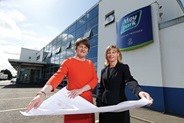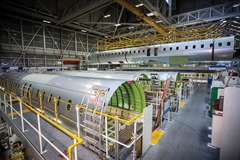Business in brief
Tamboran drill site
Energy developer Tamboran Resources has confirmed that it will drill an initial borehole near Belcoo, County Fermanagh. The project, reaching a depth of 750m, is due to commence in late August and must be completed by 30 September. Rock samples will be analysed for the presence of natural gas. The company’s licence was granted in 2011 and will continue to 2016.
Michael McKinstry has been appointed as CEO of Phoenix Energy Holdings, succeeding Peter Dixon.
He is currently its Finance Director and will take up his new post at the end of September. Phoenix is owned by the Australian investment group Hastings which purchased the company from Terra Firma last August.
A £170 million investment is expected to provide 528 new jobs at Moy Park’s plants in Dungannon, Craigavon and Ballymena. One hundred jobs are already in place as part of the programme and the remainder are due to be created over the next four years.
Moy Park is owned by Brazilian multi-national Marfrig and currently has around 11,000 employees. The company plans to roll out additional processing lines and establish an ‘innovation centre’ for product development and financial shared services at Craigavon. Invest NI will provide £9.5 million towards the expansion.
“Moy Park started as a small farming company in 1943 and has grown into a top UK business with a £1.5 billion turnover,” CEO Janet McCollum said. “We continue to have big ambitions and this investment will allow us to further grow our operations and create new jobs.” Marfrig CEO Sergio Rial added: “We have had ongoing positive engagement with the Northern Ireland Executive and have experienced a very pro-business attitude.”
A series of positive announcements over the summer has affirmed Northern Ireland’s edge in the aerospace sector. The Northern Ireland Advanced Composites and Engineering Centre (NIACE) will invest £6.8 million in developing high quality composite products. NIACE is based in East Belfast and the investment includes £5 million from Invest NI.
Companies from other sectors, such as automotive manufacturing and renewable energy, will be able to collaborate with University of Ulster and Queen’s University Belfast researchers at the centre. NIACE Manager Scott King remarked: “There are great development opportunities for industry in Northern Ireland, and I am delighted that NIACE is the focal point for these.”
Bombardier Aerospace has announced its third wave of projects in the SC21 supply chain development programme and will work with six local design and engineering companies.
Aircraft seat manufacturer B/E Aerospace, based in Kilkeel, is also joining the SC21 programme and will collaborate with five suppliers. Thompson Aero Seating in Portadown is meanwhile rolling out a £10 million investment. Fifty-two jobs have already been created and a further 33 are planned, thus increasing its workforce to 170.
Thompson’s Chief Executive, Gary Montgomery, said: “Our target is to grow sales of our patented seating concepts by over £40 million in the next two years and, with an already very strong order book confirmed, we are well positioned to achieve this objective.”
A major academic review suggests that the economic benefits of sports and cultural events are likely to be over-estimated. The exercise was carried out for the What Works Centre for Local Economic Growth, which brings together researchers from the London School of Economics, Centre for Cities and Arup.
Its findings are particularly relevant to Northern Ireland as the Executive is investing significantly in events, including the 2019 British Open. Traders in Portrush reported low levels of trade during the Irish Open as most spectators stayed within the venue.
The centre found that only 36 out of 550 post-event evaluations met its standards for scrutiny. Evidence from these case studies suggested that measurable economic effects “tend not to have been large and are often zero.”
Wage and income effects are “usually small” and only benefit specific types of employees in the immediate locality.
Facilities may improve property prices but only in the neighbouring area. The trade and tourism benefits “may be short-lived” and are only considered in a small number of studies. The centre hopes that its expertise can help to make evaluations more accurate and is encouraging policy-makers to get in touch.
Wrightbus International has won a fourth consecutive contract from SBS Transit in Singapore alongside its partner Volvo Bus. The company will supply 415 double-deckers between 2015 and 2017.
A total of 1,015 similar vehicles (see above) have been delivered since 2011.
The buses – based on Volvo’s B9TL chassis – will be supplied and packaged in ‘complete knocked down’ kits from Wrightbus’ Ballymena plant and then shipped to Singapore where they will be assembled by Comfort Delgro Engineering.
Steve Harper, Wrightbus International’s Business Development Director, noted that the tri-axle, air conditioned buses have been “specifically developed and designed to meet the stringent requirements of the Singapore climate and high passenger numbers.” Singapore’s public transport market is a duopoly with SBS being slightly larger than its competitor, SMRT.
Promising bank results
Northern Ireland’s four main banks have returned to profit in a further sign of economic improvement. The increased performance, though, has been partly achieved through redundancies and bank closures thus changing the local footprint of banking in the province.
Ulster Bank made a £55 million overall profit in the first six months of 2014 compared to a £381 million loss in the same period last year. It is expecting pre-tax profits of £2.65 billion for January-June 2014. Expenses have increased since the start of the year due to the Republic’s new bank levy and the setting up of RBS’ capital resolution division. The UK Government holds an 81 per cent share of RBS.
Bank of Ireland UK, which mainly comprises its operations in Northern Ireland, made a profit of £46 million over the first six months of 2014, compared to a loss of £97 million in January-June 2013.
Pre-tax profits at Danske Bank Northern Ireland stood at £44.8 million for the first six months of 2014 compared to a £800,000 loss in the same period last year.
First Trust Bank is part of Allied Irish Banks UK, which made a pre-tax profit of £17 million so far this year – an improvement from last year’s half-year figure of £5 million. It remains 99.8 per cent owned by Irish tax-payers.










